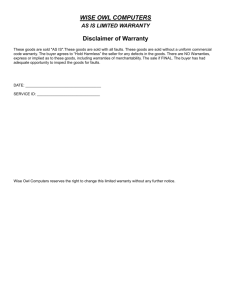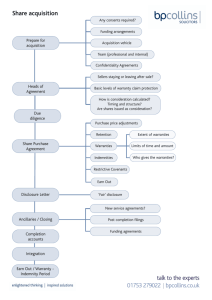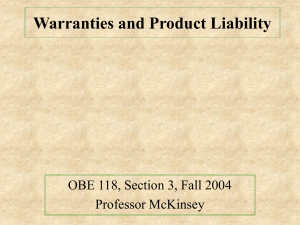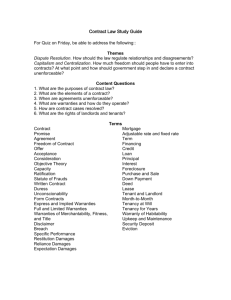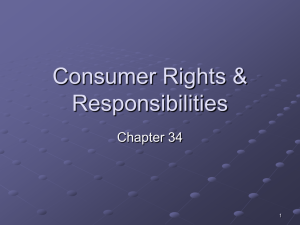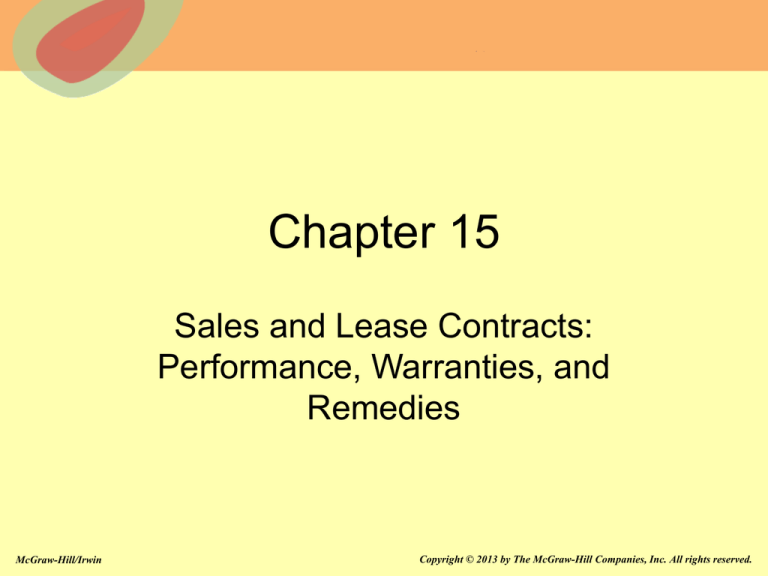
Chapter 15
Sales and Lease Contracts:
Performance, Warranties, and
Remedies
McGraw-Hill/Irwin
Copyright © 2013 by The McGraw-Hill Companies, Inc. All rights reserved.
The Basic UCC Performance
Obligation
• Sellers and lessors are obligated to transfer and
deliver conforming goods
• Buyers and lessees are obligated to accept and
pay for conforming goods in accordance with terms
of contract
• “Good faith” required in performance and
enforcement of every contract
15-2
“Good Faith”
• Definition: Honesty in fact
• In transaction between merchants, UCC also
imposes obligation of reasonable commercial
standards of fair dealing (“commercial
reasonableness”)
15-3
“Perfect Tender” Rule
States that if goods or tender of delivery
fail in any respect to conform to contract,
buyer/lessee has right to:
1) accept the goods;
2) reject entire shipment; or
3) accept part and reject part
15-4
Exceptions to “Perfect Tender” Rule
• Industry Standards
• Prior Dealings Between Parties
• Exceptions Outlined in Parties’ Agreement
• Seller’s/Lessor’s Right to Cure
• Destroyed Goods
• “Substantial Impairment”
• “Commercial Impracticability”
15-5
“Commercial Impracticability”
Doctrine
Delay in delivery or non-delivery may not, in
court’s discretion, constitute breach if performance
made impracticable because contingency has
occurred that was not contemplated when parties
reached agreement
15-6
Inspection, Rejection and Revocation of
Acceptance
• Seller/lessor must provide buyer opportunity to inspect
goods
• “Reasonableness” governs inspection process
• Post-inspection, buyer has option to accept, partially accept,
reject, or revoke acceptance
-UCC guidelines govern right to exercise particular options
post-inspection
• Buyers/lessees must give reasonable notice upon exercising
right of rejection/revocation of acceptance
15-7
Warranties
15-8
Warranty
Definition: Seller’s promise(s) regarding
certain characteristics of good(s) sold
15-9
“Express” Warranty Versus
“Implied” Warranty
• Express Warranty: Explicitly stated in
contract
• Implied Warranty: Automatically (by
operation of law) applied to contract
15-10
Types of Warranties
Warranties of Title
• Passage of good title
• Implied promise of no liens/judgments against
title
• Implied promise that title not subject to claims of
intellectual property (copyright, patent, or
trademark) infringement
15-11
Types of Warranties
Express Warranties
• Description of good’s physical nature or its use
• May be found in advertisements or brochures
• May be material term of contract
• Salesperson’s oral promise concerning good can
give rise to express warranty
• Buyer’s reliance on seller’s representations generally
means those representations become express
warranties, and part of contract
15-12
Types of Warranties: Implied Warranties
• Implied Warranty of Merchantability (Definition): Warranty
based on reasonable expectation of product performance
• Good purchased must:
-Pass without objection in trade/market for similar goods
-Be of fair quality (within the product’s description)
-Be fit for “ordinary use”
-Have “even kind, quality and quantity”
-Be adequately packaged and labeled
-Conform to promises made on package/product label
15-13
Types of Warranties: Implied
Warranties
Implied Warranty of Fitness For Particular Purpose
(Definition): Warranty that arises when seller knows
purpose for which buyer purchasing goods, and buyer
relies on seller’s judgment to recommend/select
certain product
Seller does not have to be merchant to make this
warranty
15-14
Types of Warranties: Implied
Warranties
Implied Warranty of Trade Usage
(Definition): Warranty that arises as result of
generally-accepted trade practices
15-15
Warranty Rights of Third Parties:
Third Party Beneficiaries of Warranties
Seller’s warranties may extend to:
• Buyer’s household members and guests
• Any “reasonable and foreseeable” user
• Anyone injured by good
15-16
Warranty Disclaimers and Waivers
Methods of Disclaiming/Waiving Warranties:
• Seller does not make express warranties
• Seller disclaims implied warranties in clear,
unambiguous, conspicuous language
• Buyer fails/refuses to examine goods
• Buyer fails to file suit within applicable statute
of limitations period
15-17
UCC Remedies Available to Seller/Lessor
When Buyer/Lessee In Breach of
Contract
•
•
•
•
•
•
Cancel Contract
Withhold Delivery
Resell/Dispose Of Goods
Sue to Recover “Benefit of Bargain”
Stop Delivery
Reclaim Goods
15-18
UCC Remedies Available to
Buyer/Lessee When Seller/Lessor In
Breach of Contract
•
•
•
•
•
•
•
•
Cancel Contract
Obtain “Cover”
Sue to Recover Damages
Recover Goods
Obtain “Specific Performance”
Reject Non-Conforming Goods
Revoke Acceptance of Non-Conforming Goods
Accept Non-Conforming Goods and Seek Damages
15-19
Liquidated Damages
• Definition: Damages identified before contract breach
occurs
• General Rule: Parties are free to negotiate a liquidated
damages contract clause
• General Rule: Courts will enforce liquidated damages
provisions, so long as they are non-punitive
• UCC Section 2-718: Allows non-breaching seller to
claim against breaching buyer 20% of purchase price
or $500, whichever is less, as liquidated damages
15-20
Modifications/Limitations to Remedies
Otherwise Provided by the Uniform Commercial
Code
• General Rule: Parties to sales and lease contracts are
allowed to modify/limit remedies
• UCC Sections 2-719 and 2A-503 provide that parties are
allowed to create an agreement making it clear the remedies
outlined by their agreement are the exclusive remedies
available to them
• Courts generally uphold modifications/limitations to remedies
unless stipulated remedies “fail in their essential purpose”
15-21

